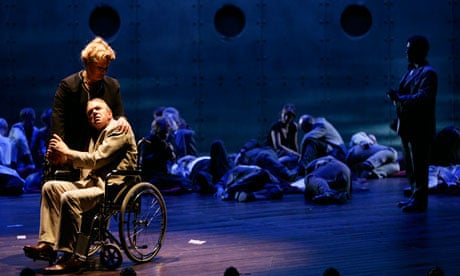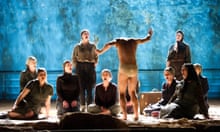English National Opera's new production of John Adams's The Death of Klinghoffer opens on Saturday. It's a piece that you can hardly talk about without calling it "controversial" or "shocking", because of its depiction of the events of the hijacking of the Achille Lauro by Palestinian terrorists and the murder of the disabled American Jewish passenger, Leon Klinghoffer.
The storm around the piece has been raging ever since its premiere productions in Brussels and Brooklyn in 1991. There were protests at the opera's US premiere, followed by accusations that the piece romanticised the terrorists and ought, in the wake of the 9/11 attacks, be censured, if not actually banned. The acme of those criticisms came from Richard Taruskin, writing in the New York Times in 2001; he gave a further gloss in his collection of essays, The Danger of Music. (You can see that postscript here in Google Reader it's on pages 174-180.) Taruskin has fun having a go at various Guardian and Observer journalists and other "tattered remnants of the British Left", including yours truly, dubbed a "complacent Gentile" because of what I said on Radio 4's Front Row about Scottish Opera's 2005 production, the first British staging of the piece, namely that I didn't find the piece anti-semitic, and that I felt it dares to depict both terrorists and victims as human beings.
For more on all of this, read Stuart Jeffries's insightful interview with Alice Goodman.The problem with all of this controversy is how far it takes us away from the music of Adams' opera. The most controversial question of all has yet to be asked or answered: is the opera any good? Does it deserve all these column inches on the basis of its music and its drama rather than just its subject? John Adams thinks it contains some of the best music he's written, and English National Opera's new production should be above all a chance to come to your own conclusions about what's left in Klinghoffer apart from its "shocking" subject-matter. Scottish Opera's production revealed, to me at least, a problematic piece that felt at times like an oratorio, sometimes like an action film, and occasionally like an opera. That could as much have been Anthony Neilson's staging as Adams's and Goodman's music and libretto; I'm looking forward to seeing what Tom Morris does with it at the Coliseum in London.
But it's the music that's the most important thing. The best answer to the criticism of the piece, especially Taruskin's, comes from an article by Robert Fink, that I think wisely, sensitively, and cogently shows how the opera humanises and dramatises conceptions of American Jewishness in general, and Leon Klinghoffer in particular. Here's the whole article, and if you've time to read it, Fink will set up the issues in more depth and with greater insight than any other piece I've read on the opera. Make up your own mind, but it's the musical evidence that Fink draws out from Adams's score that convinces me that the opera does not romanticise terrorists, but rather, "tries for something much more difficult ... The Death of Klinghoffer attempts to counterpoise to terror's deadly glamour the life-affirming virtues of the ordinary, of the decent man, of small things". As Klinghoffer sings, "I came here with/My wife. We both/Have tried to live/Good lives. We give/Gladly, receive/Gratefully, love/And take pleasure/In small things, suffer,/And comfort each other./We're human. We are/The kind of people/You like to kill". Listen to Leon Klinghoffer's music mid-way through the first scene of the second act to hear what Fink means - at a point that's an oasis of simple humanity Klinghoffer sings the words "I should have worn a hat" to some of the most hauntingly radiant music in the whole opera; this comes after the violent, idiotic, ideological tirades of the terrorists.
In a recent article on the Klinghoffer affair in The Telegraph, Robert Fink himself comments "I wish that Leon Klinghoffer's family could see the portrayal of him for what it was, which was a tribute to the quiet decency of an ordinary person who behaved, in the worst of circumstances, like a Mensch". Lisa Klinghoffer, one of Leon and Marilyn's daughters, is also quoted: "The opera displays thoughts and feelings about our parents and friends they never had or expressed. Prior to the production, I tried to tell Peter Sellars [the director of the original staging] about our parents, but he said that he did not want or need to hear them. To us he was willing to distort the image of our parents and to show a stereotypical picture of the 'fat cat' American Jew to express his political agenda."
There will always be unanswered and possibly unanswerable questions that The Death of Klinghoffer raises. Better though, by far, to raise them, to stage the opera, to see the production, and to work out your own responses to this troubling, problematic, and sometimes ravishingly beautiful piece.





Comments (…)
Sign in or create your Guardian account to join the discussion